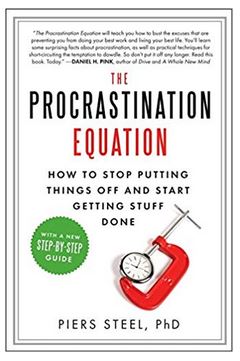4 ways to beat procrastination
To procrastinate is to be human (if animals do, we haven’t worked out how to tell yet).
But we know a lot more about how procrastination works, thanks to Dr Piers Steel, author of the book “The Procrastination Equation”. 
Thanks to Dr Steel, we can pull apart the behaviour we call procrastination and work out where specifically we can make a difference.
I found this article explaining How We Use The Procrastination Equation particularly easy to read.
It summarises the things that movitate us:
- Expectancy
- Value
AND the things that get in the way of our motivation:
- Impulsiveness
- Delay
With a better understanding of the process of MOTIVATION, we have more options to reduce our procrastination.
Motivation = Expectancy x Value
_______________
Impulsiveness x Delay
Maximise Expectancy
Expectancy is about how realistic it is to achieve the result you want.
For example, if you haven’t had a lot of luck with weight loss, you may not see your goal as achievable.
One way to make a goal more achievable could be to make it something you have the skills to achieve.
For example, if you like cooking, then it may be more achievable for you to set your goal as “eat 8 serves of low carb vegetables per day” rather than “lose 10 kg”. If you live somewhere with lots of walking tracks, it could be to go for a walk every day.
Maximise Value
Value is about the enjoy-ability of either the process or the result.
Again, with weight loss, it could be that you find an enjoyable form of exercise like dancing or table tennis.
A lot of people never actually spend time to imagine what it would FEEL like to be 5KG lighter. By spending time to fully imagine how you will feel and what you will do in your new, leaner body, you could make your result more real and hence more valuable. Imaging going shopping for a smaller size of clothes and finding something fabulous, for example.
Minimise Impulsiveness
Think about what specifically distracts you from doing your personal “shoulds”. Make a list of them. Do you wind up on Facebook or suddenly get the urge to do the dishes?
Then put together some strategies to deal with your distractions. Turn notifications off on your phone – or turn the screen display from colour to greyscale – because that’s visually less distracting.
Minimise Delay
We’re much better at getting things done in the short term. So a goal of losing 1KG every 8 weeks is a much shorter time and easier to manage.
The other useful tip is to make your goal public, so that it’s harder for YOU to delay – because you’ve make a promise to some else. You might find an exercise buddy, so you’re more accountable. Or take a friend to cooking classes.
Get Support; Ask for help
Remember that being human is challenging at times; let’s learn with and from others to maximise our enjoyment of life. This is part of the Health coaching I support patients with during a consultation.






